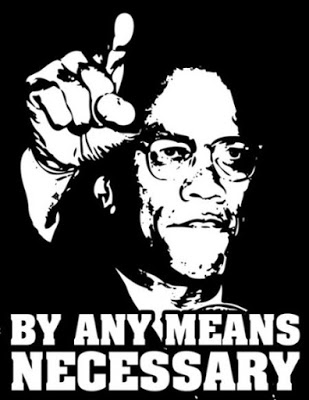By any means necessary Tlaxcala Editorial, February 21st, 2020
 |
| Tlaxcala 21/02/2020 |
This February 21st, 2020 marks the 15th anniversary of our creation and as we enter our fifteenth year, more than ever are we convinced of the usefulness of our work as relay runners. It also marks the 55th anniversary of the assassination of Malcolm X, the luminous revolutionary whose itinerary and message are of astounding relevance today.
Malcolm Little was also a child-martyr. From the age of 9, he was sent to homes and foster care families with his seven siblings after his mother, maddened by the murder by white racists of his father, a disciple of Marcus Garvey and apostle of the “Back to Africa” movement, was locked up in forensic psychiatry. A good student, he dropped out of school after one of his favourite teachers told him that his dreams of becoming a lawyer were “unrealistic for a Negro” and it would be better for him to learn to be a carpenter. Between the ages of 17 and 21, he was a petty criminal, drug dealer and pimp. He ended up in prison in 1946, when aged 21. When he came out six years later, he had become a different man. That is, in prison, he had met Black Muslims, which he joined within The Nation of Islam. He had read a lot, reflected upon what he read, and discussed it with his fellow-suffering brothers. He had become what we now call an “Islamist”. The Nation of Islam was a movement that aimed for the moral regeneration of Black people, who had been disintegrated by the dominant white system, which a century after the abolition of slavery, still refused citizen status, and even human status, to “Negroes”. The Black Muslims did not demand equality, but separation, a kind of “back to Africa” while staying on US soil. Malcolm broke with them when on his return from a long tour that took him from Mecca to Algiers via Cairo and Accra, he learned that in his absence, Elijah Muhammad, the great leader of the Nation of Islam had initiated discussions with the Ku Klux Klan on a state project reserved for Blacks somewhere in the South, in Alabama or Missouri.
In Mecca, Malcolm saw believers of all colours and backgrounds mingling fraternally. He had drawn conclusions on the need for US Blacks to build alliances with all the other oppressed of “Babylon” to free themselves together. On June 28th, 1964, he officially launched a new movement, the Organization of Afro-American Unity. By his decision to take a revolutionary position, he had attracted close surveillance from the FBI for years already. By his criticism of the separatist line of the Nation of Islam, he made enemies of his former brethren. Three of them, manipulated by the FBI, assassinated him on February 21st, 1965.
No one among the Kouachi brothers, Amédy Coulbaly, and Omar Al Hussein, turned into a new Malcolm X during their stay in prison. They could only achieve the status of useful idiots, who died for nothing. They were unable to identify the real causes and those really responsible for their malaise, and chose the easy targets. All those who dream of imitating them, should ponder over what Malcolm X said:
We declare our right on this earth to be a man, to be a human being, to be respected as a human being, to be given the rights of a human being in this society, on this earth, in this day, which we intend to bring into existence by any means necessary.
—Malcolm X, speech at the Organization of Afro-American Unity Founding Rally on June 28, 1964
This expression, – by any means necessary – had entered the Anglo-American language through the translations of Les Mains Sales by Jean-Paul Sartre, where the two main characters say:
HOEDERER: I wasn’t the one who invented lying. It grew out of a society divided into classes, and each one of us has inherited it from birth. We shall not abolish lying by refusing to tell lies, but by all means necessary to abolish classes.
HUGO: All means are not good.
HOEDERER: All means are good when they’re effective.
—Jean-Paul Sartre, Dirty Hands: act 5, scene 3. 1948
Much has been said in the USA of the meaning of Malcolm’s words: was it an apology for violence? Probably yes, necessary violence, but who decides, and how, when violence is necessary? And how to judge that the means used were effective? Obviously by the fact that it allowed those who used them to reach their goals. But they still need to have a clear idea of what they want. These lost dogs without collars, converted to jihadists, obviously did not. They were condemned to doing the dirty work on the behalf of others who, themselves, know exactly what they want: to keep the upper-hand and control over humanity, by assuming the right to decree who is part of it and who must be excluded. By any means necessary.


